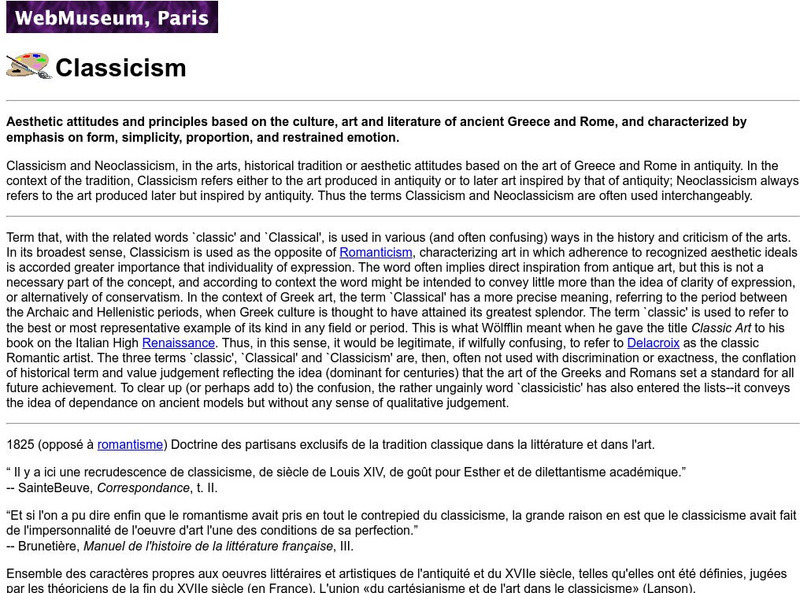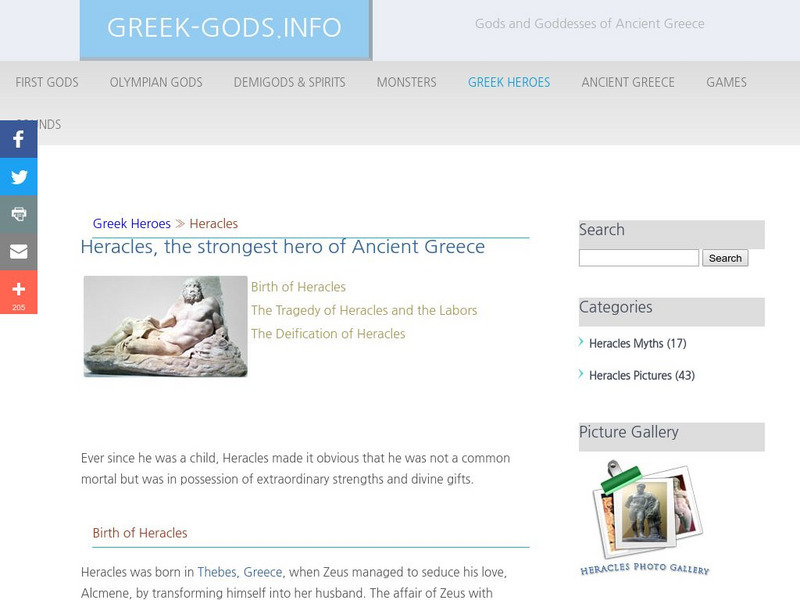Lumen Learning
Lumen: Boundless Communication: History of Public Speaking
This lesson offers a brief history of public speaking drawing upon the Western thought from Greece and Rome with Aristotle and Cicero. It lists and discusses the periods and the major speakers of each period.
ClassFlow
Class Flow: Ancient Civilizations
[Free Registration/Login Required] This flipchart is an assessment of ancient civilizations from Mesopotamia to Ancient Rome using true/false, Venn-diagrams, and cloze activities.
Other
University of Illinois: The Early Centuries of the Greek Roman East
Read about the history of the Romiosini, or Greek Middle Ages and the development of the Greek-Roman east. The article is divided into two different sections. The first section includes the foundation of Constantinople as a means to...
Khan Academy
Khan Academy: Introduction to Ancient Rome
From a Republic to an Empire. In legend Rome was founded in 753 B.C.E. by Romulus, its first king. In 509 B.C.E. Rome became a republic ruled by the Senate (wealthy landowners and elders) and the Roman people. During the 450 years of the...
Other
Women in World History Curriculum: Female Fury in the Forum
This lesson uses two examples of women asserting their power in Roman history to show what rights they really had. Activities are discussion based but could be easily expanded upon.
ibiblio
Ibiblio: Web Museum: Classicism
This site gives an overview of classicism, then proceeds to compare it with neoclassicism. The article then explores the roots of the term "classicism" and its inherent meaning to the Greeks and Romans. Contains a French translation.
ClassFlow
Class Flow: Roman Roads
[Free Registration/Login Required] In this lesson students recognize that Roman roads were built around 312 BC to allow ease of movement for troops and communication. Several pictures of Roman roads in the UK, Spain, Tunisia, Egypt,...
Ducksters
Ducksters: Greece History and Timeline Overview
Kids learn about the history and timeline of the country of Greece including ancient Greece, Athens, Sparta, democracy, Alexander the Great, Roman rule, the Ottoman Empire, independence, and current events.
University of Virginia
Etruscan and Roman Medicine
Gives a short description on the practice of medicine in Etruscan and Roman societies. The first doctors came from Greece but Roman medicine tended to be more of a "home remedy," situation.
Khan Academy
Khan Academy: Polykleitos, Doryphoros (Spear Bearer)
Greek art became popular when Roman generals began conquering Greek cities. This work so impressed the Roman elite that studios were set up to meet the growing demand for copies. The Doryphoros was one of the most sought after, and most...
Famous Scientists
Famous Scientists: Galen
Learn about the man whose medical doctrine dominated the Western and Arab worlds for close to 1500 years.
Sophia Learning
Sophia: Principles of u.s. Government
Tutorial presents an introduction to the principles of the United States democratic government highlighting the differences and similarities between Roman and U.S. governments.
University of Illinois
University of Illinois Urbana Champaign: Krannert Art Museum and Kinkead Pavilion: Collections
The Krannert Art Museum provides a great collection of artwork from all over the world. Click on "collections" to access images of African, Egyptian, America-Pre-Columbian, USA, Ancient Gandhara, China, India, Japan, Thailand, Greece,...
Khan Academy
Khan Academy: Bronze Head From a Statue of the Emperor Hadrian
Hadrian (reigned 117-138 C.E.), once a tribune in three different legions of the Roman army and commander of a legion in one of Trajan's wars, was often shown in military uniform. He was clearly keen to project the image of an ever-ready...
World History Encyclopedia
World History Encyclopedia: Burial
Illustrated encyclopedia entry provides a timeline and explanation of ancient burial rituals in Egypt, Greece, India, Rome, China, Scotland, and Ireland.
Greek Gods
Greek Gods: Greek Heroes: Heracles
This site focuses on the Greek hero Heracles including his ancestry, pictures, events in his life, and links to myths about him.
Bartleby
Bartleby.com: Bulfinch's Mythology: Bacchus
The history of the god Bacchus, the god of wine, includes the perilous circumstances of his birth and the foundation of his devotions, the Bacchanal.
Other
Macedonian Heritage
Macedonian Heritage offers an extensive look at the history, affairs, and culture of Macedonia. You can see timelines, documents, and look at maps of the area.
University of Chicago
Ancient Mesopotamia: The Role of Women [Pdf]
Students could use a copy of Hammurabi's Laws to discover what rights women did and did not have in ancient Mesopotamia. They could then do research to compare the lives of women in Mesopotamia with the roles and social status of women...
Curated OER
Etc: Clip Art Etc: The City of Constantinople (Byzantium)
Byzantine Constantinople had been the capital of a Christian empire, see Christendom, successor to ancient Greece and Rome. Throughout the Middle Ages Constantinople was Europe's largest and wealthiest city, known as the Queen of Cities...
Curated OER
Educational Technology Clearinghouse: Clip Art Etc: Griffin
In heraldry, the griffin is a fabulous animal, with the head and forefeet of an eagle, and the body, hind legs, and tail of a lion. The head is represented with pricked ears, symbolical of its vigilance. In mythology, the griffin was a...
Khan Academy
Khan Academy: World History: 600 Bce 600 Ce Second Wave Civilizations
We have 2 resources from here but should be cross-checked against embedded videos.
Curated OER
Unesco: Greece: Pythagoreion and Heraion of Samos
Many civilizations have inhabited this small Aegean island, near Asia Minor, since the 3rd millennium B.C. The remains of Pythagoreion, an ancient fortified port with Greek and Roman monuments and a spectacular tunnel-aqueduct, as well...
Other
"A Well Trimmed Ship", the Republican Legacy of Polybius
A two-part paper, the first of which is a biography of Polybius, a Greek, who wrote a history of the Roman Republic. The second part discusses his work and his admiration of Roman virtues and the government of the Roman Republic.


















